人教版高中英语必修三Unit1 Warming up,Pre—reading and Reading学案(精修版)
高中英语_unit 1 Warming up & Reading教学设计学情分析教材分析课后反思
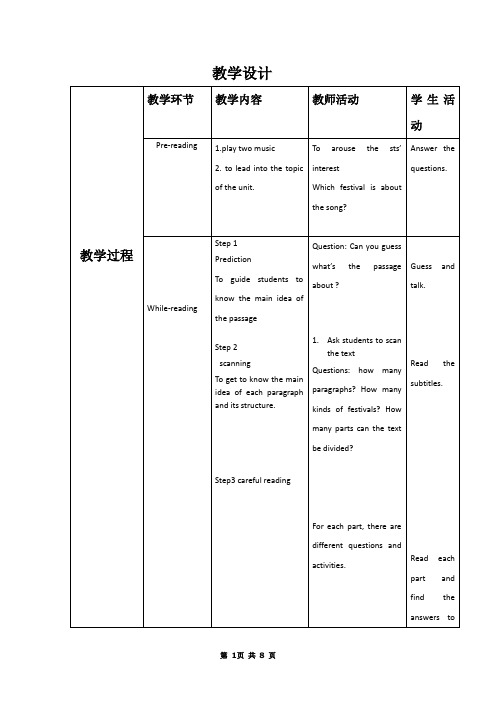
教学设计学情分析授课对象为高一年级学生。
从英语能力上讲,这个阶段的学生总体具有一定的英语基础,能够使用简单英语表达自己的想法,同时个体差异大,同班级学生学力往往参差不齐。
从性格上讲,高中学生比较成熟,对课堂质量要求比较高,不如初中学生容易调动。
从思想深度上讲,该年龄段学生,其人生观和价值观初步形成,对于事物有一定的批判性思考能力,同时,由于涉世未深,对事物的看法相对而言比较简单,思维的深度和广度有待加强。
具体到录课当天的情况:本次上课用的是自己班的学生,对学生的基本情况还是比较了解的,学生的英语水平底子并不好。
由于到新的录课教室,且学生刚上完体育课,时间匆忙,学生坐位随意,平时的讨论小组有打乱的情况,只好现场重新分组,对小组讨论产生了影响。
针对学生的精神状态和班级情况,我采取了以下对策:一、教学过程中多以低层次问题(如一般疑问句问题)开始提问,根据学生的反馈逐步提高问题难度;二、对于教学设计里较深层阅读任务的探讨性问题,适时根据学生的状态和回答进行追问,必要时给予范例和提示进行引导。
三、利用多媒体结合本课话题播放了有关节日的歌曲,以提高学生学习的兴趣。
利用让学生动手设计自己喜欢的节日,以提高学生讨论的兴趣。
录课现场授课时间规定为45分钟以内,教师对活动的安排必须准确到位,提高效率。
效果分析采用多媒体课件作为主要的教学手段。
多媒体课件可以将文字、图象、声音三者结合起来,更加活泼生动,易于为学生所接受,也能够更好地服务于教学。
同时,借助黑板、粉笔等辅助手段开展教学活动。
本课积极采用现代教育方法和手段,在课程教学时理论联系实际,教师在讲授时,运用多媒体课件、网络教学资源等现代化手段,制作教学图片、录像等多媒体课件资料,适时示范,提高了课堂教学效果。
本节阅读课,通过让学生了解中外节日的异同,通过阅读文章,引发对节日的思考对文化的喜欢。
从题材上来讲,让学生接触总分总结构的题材,并训练相关阅读技巧。
训练了学生用英语获取信息、处理信息、分析问题和解决问题的能力。
2019_2020学年高中英语Unit1SectionⅠWarmingUpPre_readingReading

一二三四
3.仔细阅读课文“ANNE’S BEST FRIEND”并根据课文内容将短 文补充完整
This story happened in Amsterdam in the Netherlands during World WarⅡ.Because Anne’s family was Jewish,they had to hide (1) in order not to be (2) caught (catch) by the German Nazis.During that time Anne wasn’t able to go (3) outdoors (outdoor) for such a long time (4) that she
nature is one thing that really must be experienced. 观看这些已经不再是乐趣,因为大自然是你必须亲身体验的。
一二三四
四、阅读导学 1.Think of some words to describe a friend’s qualities. 答案:略 2.阅读课文“ANNE’S BEST FRIEND”,选择正确答案 (1)What does the text mainly talk about? A.The importance of keeping a diary. B.How to make friends with others. C.What Anne liked to do in her free time. D.Why Anne chose her diary as her friend. 答案: D
高中英语(人教版 必修3)教师用书:Unit 1 Section_Ⅱ Warming Up - Re

人教版英语精品资料(精修版)Section_ⅡWarming Up & Reading — Language Points(一)根据英文释义和首字母提示写出单词1.award:to give something to somebody such as a prize or money for something they have done2.trick:_to make someone believe something that is not true3.gain:to get or achieve something, usually as a result of a lot of effort 4.gather:_to get, come or bring together5.starve:to suffer or die because you do not have enough to eat(二)用所给词的适当形式填空6.They celebrated his success and the celebration lasted four hours.(celebration)7.We believe in his ability, and the belief resulted from his behavior.(belief) 8.They gained independence in 1969, and now they are a proud and independent people.(independence)9.Agricultural development lies in the science of agriculture.(agriculture) 10.Auckland is a city full of energy,_where everyone seems energetic.(energetic)1.starve vi.& vt.(使)挨饿;饿得要死;(使)饿死vi.渴望;极需要★背诵佳句培养语感(教材原句)At that time people would starve if food was difficult to find, especially during the cold winter months.在那个时代,如果食物难以找到,特别是在寒冷的冬月,人们会挨饿。
高一英语必修3Unit1Festivals around the world-Warming up and readingPPT 课件

the Mid-autumn Festival China/Japan
the Spring Festival
China
Carnival
western countries
Easter
western countries
Cherry Blossom Festival Japan
Scanning
Answer the following questions:
ancestors back to home.
Obon
in Japan
When the festival is over, thousands of lanterns are placed into the water and they drift out to sea guiding the dead on their return journey to the other world.
What festivals can we find in each month?
Calendar
January February March
New Year Chinese New Year Women’s Day
Valentine's Day
Calendar
April
May
June
Easter
Columbus Day in the USA
in memory of the arrival of Christopher Columbus in America
Mahatma Gandhi Day
October 2 is a national festival in India to honour Mahatma Candhi
人教版英语必修1:Unit3 section ⅰ warming up & reading
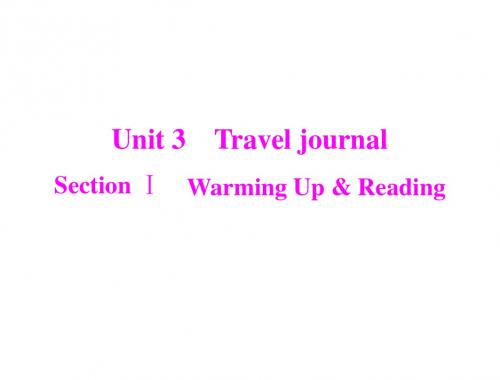
Two years ago she bought an expensive mountain bike
and then she persuaded me to buy one.两年前,她买了一辆昂贵 的山地自行车,然后说服我也买了一辆。 4.persuade vt.说服;劝说 点拨 (1)persuade sb.to do sth. =persuade sb.into doing sth.
In order to know more information about the Mekong River, they went to the library to find a lot of good maps showing the
world geography.They were sure to finish the trip successfully.
到美国的飞机票价是多少? 辨析 fare/fee/charge (1)fare 指旅费,经常指乘坐交通工具的票价。 (2)fee 指酬金、入场/会费、专业服务或课程等的费用,指 定期支付的费用(尤指学费)时常用复数。 (3)charge 泛指各种费用、价钱。
运用 用上面所提供的辨析词的适当形式填空 charge ①Delivery is free of ________. ②I need some money for my bus________. fare
D.After graduating from college.
D 2.Who thinks Wang Wei is really stubborn?_______. A.Yu Hang. B.Dao Wei.
C.Wang Wei's cousins.
D.Wang Kun.
高中英语人教版必修1《Unit 3 Period 1》课件

• 完成句子 • ①I prefer to walk there ________(也不愿意乘公共汽
车). • 【答案】rather than take a bus • ②I prefer spending the weekend at home to
________________(也不愿和他们一起去郊游). • 【答案】going on an outing with them
• 我宁愿读书而不愿闲坐在那儿。
• I prefer to do this rather than that.
• 我喜欢做这件事而不愿做那件事。
• (3)prefer sb to do…愿意让某人做某事
• I'd prefer him to paint the door blue. • 我宁愿他把门漆成蓝色。 • 【温馨提示】 • prefer不可用more,most来修饰。 • Which of these hats do you prefer best?(误) • Which of these hats do you like best?(正) • I prefer this more than that.(误) • I prefer this to that.或I like this more than that.(正)
• 4.…the air ________ ________ ________ ________ ________(会呼吸困难)
• 【答案】would be hard to breathe
• Ⅳ.预读理解 • 回答下列问题 • 1.________ is the first one that had the idea to cycle
• 【答案】have dreamed about ta a great bike trip
2021英语人教选修课件:Unit3 Ⅰ—WarmingUpPre-readingReading

从以上我们可以得出这一结论:工作越多越幸福,也越健康。
理解诱思 1.What is the best title for the text? A.People Should Find a Job B.Hard Work Is Good for Health C.People Should Make More Friends by Work D.The Loss of Work Means the Loss of Everythingthe text we can learn that
.
A.you can only become addicted to cigarettes in two different ways
B.smoking makes no difference in women becoming pregnant
C.if you have failed several times to stop smoking,you should feel
ashamed
D.you’d better not choose a stressful day to quit smoking
答案:D
一二三四五
4.In his girlfriend’s eyes,what kind of person was James’ grandfather?
一二三四五
五、下面是课文原文的浓缩,仔细阅读并根据课文内容将其补充完
整
James’ grandfather is told that James started smoking some time
新人教版必修高中英语UnitFriendshipSectionⅠWarmingUp

⑯when 在此引导定语从句,修饰 one evening。 ⑰stay link v.保持,继续是,相当于 keep,其后接形容词作表
语。stay awake 醒着 ⑱on purpose(=by design)故意反义短语:by accident/chance 偶
然地Байду номын сангаас⑲in order to 为了……,同义短语:so as to 为了…… ⑳have a good look at 好好看看……
[多积词汇] ①seek v.寻找 ②individual adj.个体的 ③interdependent adj.相互依赖的 ④conflict n.冲突 ⑤accurate adj.准确的 ⑥depressed adj.沮丧的 ⑦a ripple effect 连锁反应 ⑧effect n.作用;影响
So next time you're talking to a friend, try using more “we-talk”. You may find yourself feeling more positive — and the effect⑧ it will have on your friend will be positive as well.
Too much “I-talk” can make you feel depressed⑥. But “we-talk” can encourage you to become more positive and create a ripple effect⑦ of healthy interdependence with others.
[读文清障] ①whom 在此引导定语从句,修饰 a friend。 ②go through 经历;经受 what 在此引导宾语从句,作 going
新人教版必修三 Unit 1 Festival around the world单元教案

Festival around the world单元教案人教版新课标必修 3 unit 1教材分析和教材重组教材分析本单元以节日为话题,介绍了世界各地的一些节日、含义、由来和民俗。
通过本单元的学习,可以帮助学生更多地了解节日、体味文化;同时又能教育学生理解、尊重不同的文化和习俗。
通过本单元的语言技能训练,要求学生学会使用请求以及感谢的表达法。
1. Warming Up 要求学生以小组形式完成一个表格填充,列出中国的五个节日和这些节日的时间、庆祝的内容以及节日里人们的所作所为。
激发学生的阅读兴趣,为本单元Reading部分的世界节日做好铺垫。
2. Pre-reading 通过若干个问题了解学生对节日的认识,比如:你最喜欢的节日是什么?你喜欢与家人还是与朋友共度佳节?你喜欢节日的哪部分——音乐、拜访朋友,可看的还是可吃的?3. Reading 由五篇小短文组成,分别介绍古代节日、亡灵节、纪念名人的节日、丰收节和春天的节日等,使学生了解节日的由来及其存在的意义。
最古老的节日主要庆祝冬天的结束,春天的播种,秋天的收获等。
鬼节是为祭奠亡灵,取悦祖先而举行的节日,例如日本的盂兰盆节(Obon),墨西哥的亡灵节,万圣节(Halloween)等。
纪念名人的节日有中国的端午节,美国的哥伦布日,印度的甘地纪念日。
春天的节日包括中国的春节,西方的狂欢节、复活节,日本的樱花节。
4. Comprehending 第一部分提出的6个问题让学生对所读文章有一个浅层理解。
第二部分要求学生讨论哪些节日是最重要的,哪些是最有趣的,结合所读文章和自己的想法填表。
第三部分要求找出各个节日中共有的三件事,然后与同伴讨论为什么这些事情对各地的人们都是重要的。
这一任务不仅使学生重温所读文章的内容,而且结合他们的实际,给学生机会阐述自己的想法和观点,挖掘学生的思维潜力。
这3个练习的设置由表及里,由浅入深,非常科学。
5. Learning about Language 主要突出本单元的重点词汇和主要语法项目。
2021-2022学年人教版高中英语必修三练习:Unit 1 课时跟踪练(一) Word版含解析
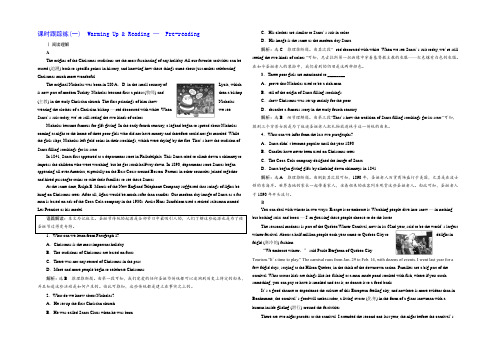
课时跟踪练(一) Warming Up & Reading — Pre-reading Ⅰ.阅读理解AThe origins of the Christmas traditions are the most fascinating of any holiday. All our favorite activities can be traced (追溯) back to specific points in history, and knowing how these things came about just makes celebrating Christmas much more wonderful.The original Nicholas was born in 280 A.D. in the small country of Lycia, which is now part of modern Turkey. Nicholas became first a priest (牧师) and then a bishop (主教) in the early Christian church. The first paintings of him show Nicholas wearing the clothes of a Christian bishop — red decorated with white. When we see Santa's suit today, we're still seeing the two kinds of colors.Nicholas became famous for gift-giving. In the early fourth century, a legend began to spread about Nicholas coming at night to the home of three poor girls who did not have money and therefore could not get married. While the girls slept, Nicholas left gold coins in their stockings, which were drying by the fire. That's how the tradition of Santa filling stockings got its start.In 1841, Santa first appeared at a department store in Philadelphia. This Santa tried to climb down a chimney to impress the children who were watching, but he got stuck halfway down. In 1890, department store Santas began appearing all over America, especially on the East Coast around Boston. Parents in other countries joined together and hired passenger trains to take their families to see these Santas.At the same time, Ralph E. Morris of the New England Telephone Company suggested that strings of lights be hung on Christmas trees. After all, lights would be much safer than candles. Our modern-day image of Santa as a fat man is based on ads of the Coca-Cola company in the 1930s. Artist Hans Sundblom used a retired salesman named Les Prentice as his model.语篇解读:本文为记叙文。
人教新课标高中英语必修三Unit 1 Festivals around the world全章教案

人教新课标高中英语必修三Unit 1 Festivals around the world全章教案I.教学内容分析本单元的中心话题是“节日”,主要讲述了不同地区不同种类的节日。
Warming Up部分设计了小组活动,通过图表填写让学生区分中国的传统节日与别国节日的异同,目的在于激活学生已有的节日背景知识,引出主题,为以后几堂课学习热身。
Pre-reading 通过几个问题,调动学生已有的知识和经验,激发学生想了解更多节日的好奇心,让他们主动参与到主题教学活动中,为下面学习阅读文章作铺垫。
Reading 部分先简要介绍了一下早期各种节日的起源以及存在的原因,然后又分别介绍了几种世界各地的节日,依次的顺序是亡灵节、纪念名人的节日、丰收节、春天的节日等。
Comprehending由四个部分组成。
第一、三、四部分通过表格形式,第二部分通过让学生回答问题的方式,鼓励学生积极思考,加深对课文的理解。
Learning about Language 部分主要突出了本单元的语法项目——情态动词的用法。
这些情态动词主要有:can,could,may,might,will,would,shall,should,must,can’t 等的用法。
Using Language 部分中包括了听、说、读、写几个部分的内容。
学生可通过对Trinidad Carnival、情人节等一些节日的学习,分析问题,锻炼自己的思维能力。
阅读后的习题及讨论不仅帮助学生理解文章的主旨大意,更重要的是让学生寻找解决问题的方法。
Learning Tip部分主要建议学生搜集各种资料,查询与世界各地节日有关的信息,了解各种节日的来源与内涵。
II.教学重点和难点1. 教学重点(1) 本单元的生词和短语;(2) 掌握一些情态动词的基本用法;(3) 了解有关节日和民俗,掌握有关词汇,如custom,religious等。
2. 教学难点(1) 增进学生对中国节日的理解,了解和感悟外国的节日;(2) 提高学生的社会文化素质,加强跨国文化素质;(3) 培养学生运用资源策略。
2019-2020学年高中英语人教版必修三Unit3全单元教案

2019-2020学年高中英语人教版必修三Unit 3 The Million Pound Bank-NoteI.教学内容分析本单元的主要内容是根据马克·吐温的名著《百万英镑》改编而成的剧本中的几个片断以及马克·吐温的生平简介。
Warming Up通过对马克·吐温及其作品的讨论引发学生学习兴趣,使学生对马克·吐温及其作品有个初步的了解。
Pre-reading首先要求学生回答几个相关的问题,并让他们展开想象,借助讨论引入到《百万英镑》的情节。
Reading部分是详细介绍富商兄弟俩打赌把一张百万英镑的钞票给一个一无所有、诚实可靠的穷人,想看看会发生什么事。
最后他们物色到一个穷困潦倒、流落伦敦街头的美国小伙子Henry Adams。
本部分可以通过先熟读后改编的形式,让学生登台表演,培养学生的调控能力和交际能力,然后再利用多种形式的练习让学生深入理解课文。
Learning about Language部分突出了词汇和语法的学习与训练。
本单元的语法是名词性从句中的宾语从句和表语从句的具体用法。
Using Language部分中包括了听、读、写三个部分的内容,是本单元主要篇章的延伸。
学生通过感受百万英镑给亨利带来什么样的待遇而进一步理解作者诙谐讽刺的写作风格。
该部分比较连贯,提出的一些问题有利于培养学生独立思考的能力和文学素养。
其中写作部分是训练学生选取和组织材料的能力,通过前面的学习,结合独立的思考,写出形象鲜明且语言流畅的戏剧。
Learning Tip指导学生掌握对话的技巧,了解如何使用相应的语音和语调来编排戏剧,提高学生的写作水平。
II.教学重点和难点1. 教学重点(1) 本单元教学目的和要求中的生词和短语;(2) 掌握名词性从句中的宾语从句和表语从句的具体用法;(3)了解戏剧(剧本)语言的特点,如舞台说明(stage directions)用一般现在时态,台词中有很多的省略句等。
高中英语新人教版精品教案《人教版新课标必修一第三单元reading教学设计》

1.通过阅读让学生掌握一些旅游相关的根本词汇和短语;
2.通过阅读以及老师教授的方法设置问题理解文章内容;
3.通过自己设置问题提升分析问题,理解文章,解决问题的能力;
4.通过小组合作的形式提升学生的合作能力;
5.通过阅读文章理解文章培养学生热爱祖国大好河山的爱国情怀。
教学重点和难点
1.如何让学生准确运用三个出题技巧准确地就文章内容而出题。
教学反思
这节课是阅读课,整堂课围绕着三个基于细节的出题技巧而展开。我觉得完成了本课的教学任务,实现了教学目标。在课堂上调动起了学生学习英语的积极性,全面的训练了学生的听、读、说的能力。与以往的阅读课比起来教法稍微新颖一些。但在学生抢答局部,学生参与度很高,但是场面有点失控,老师应多协调一下。同时后面的总结和作业局部PPT没有跟上,有待改良。
Step4 post reading
教师根据课文内容按照刚刚教授的三个出题技巧编写三个阅读理解的题目
学生在自己编题理解了文章后根据理解正确答复老师所出的三个练习题。
学生可能在编题过程中有所遗漏。旨在通过这个练习使学生进一步加深对文章的理解,也进一步熟悉刚讲过的三个出题技巧。同时培养学生前后联系能力和逻辑分析能力
Step5 homework
教师布置学生利用今天所学的三个阅读理解编题技巧对本单元的using language进行阅读理解题的编写
学生对本单元的using language进行阅读理解题的编写。
旨在利用这个练习使学生进一步熟悉并掌握三个出题技巧,同时还理解了using language里的那篇文章。
Step2before reading
教师利用2021年新课标高考英语B篇的三道细节题教授学生如何基于细节出阅读理解题。
人教版高中英语必修3人教版必修三Unit1Festivals around the world教案Period 1 Warming up and Reading
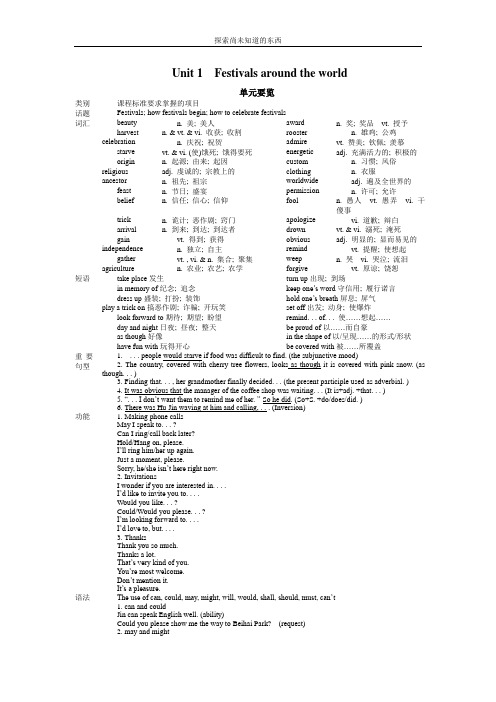
Unit 1Festivals around the world单元要览类别课程标准要求掌握的项目话题Festivals; how festivals begin; how to celebrate festivals词汇beauty n. 美; 美人award n. 奖; 奖品vt. 授予harvest n. & vt. & vi. 收获; 收割rooster n. 雄鸡; 公鸡celebration n. 庆祝; 祝贺admire vt. 赞美; 钦佩; 羡慕starve vt. & vi. (使)饿死; 饿得要死energetic adj. 充满活力的; 积极的origin n. 起源; 由来; 起因custom n. 习惯; 风俗religious adj. 虔诚的; 宗教上的clothing n. 衣服ancestor n. 祖先; 祖宗worldwide adj. 遍及全世界的feast n. 节日; 盛宴permission n. 许可; 允许belief n. 信任; 信心; 信仰fool n. 愚人vt. 愚弄vi. 干傻事trick n. 诡计; 恶作剧; 窍门apologize vi. 道歉; 辩白arrival n. 到来; 到达; 到达者drown vt. & vi. 溺死; 淹死gain vt. 得到; 获得obvious adj. 明显的; 显而易见的independence n. 独立; 自主remind vt. 提醒; 使想起gather vt. , vi. & n. 集合; 聚集weep n. 哭vi. 哭泣; 流泪agriculture n. 农业; 农艺; 农学forgive vt. 原谅; 饶恕短语take place发生turn up出现; 到场in memory of纪念; 追念keep one’s word守信用; 履行诺言dress up盛装; 打扮; 装饰hold one’s breath屏息; 屏气play a trick on搞恶作剧; 诈骗; 开玩笑set off出发; 动身; 使爆炸look forward to期待; 期望; 盼望remind. . . of. . . 使……想起……day and night日夜; 昼夜; 整天be proud of以……而自豪as though好像in the shape of以/呈现……的形式/形状have fun with玩得开心be covered with被……所覆盖重要句型1. . . . people would starve if food was difficult to find. (the subjunctive mood)2. The country, covered with cherry tree flowers, looks as though it is covered with pink snow. (as though. . . )3. Finding that. . . , her grandmother finally decided. . . (the present participle used as adverbial. )4. It was obvious that the manager of the coffee shop was waiting. . . (It is+adj. +that. . . )5. “. . . I don’t want them to remind me of her. ” So he did. (So+S. +do/does/did. )6. There was Hu Jin waving at him and calling, . . . (Inversion)功能 1. Making phone callsMay I speak to. . . ?Can I ring/call back later?Hold/Hang on, please.I’ll ring him/her up again.Just a moment, please.Sorry, he/she isn’t here right now.2. InvitationsI wonder if you are interested in. . . .I’d like to invite you to. . . .Would you like. . . ?Could/Would you please. . . ?I’m looking forward to. . . .I’d love to, but. . . .3. ThanksThank you so much.Thanks a lot.That’s very kind of you.You’re most welcome.Don’t mention it.It’s a pleasure.语法The use of can, could, may, might, will, would, shall, should, must, can’t1. can and couldJin can speak English well. (ability)Could you please show me the way to Beihai Park? (request)2. may and mightMay we see the awards for the teams? (permission; request)She might give you some new clothing. (possibility)3. will and wouldThe Spring Festival is the most fun. The whole family will come for dinner. (promise; agreement) Often he would dress up like a rich man. (past habit; custom)4. shall and shouldThe harvest festival begins on Sunday. We shall be there with our friends. (promise; agreement) You should arrive at the airport two hours before he goes. (advice)5. must and can’tWang Feng wins an award every year. He must be very strong. (speculation)You must be joking. That can’t be true. (guessing)教学重点1. Get students to know about festivals around the world.2. Have students learn some useful new words and expressions about festivals and customs and let them learn effective ways to remember English vocabulary.3. Enable students to grasp and use the expressions of request and thanks.4. Let students learn the new grammar item: the use of can, could, may, might, will, would, shall, should, must and can’t.5. Develop students’ listening, speaking, reading and writing abilities.教学难点1. Enable students to master the use of can, could, may, might, will, would, shall, should, must and can’t.2. Let students learn to write a different ending of a story.3. Develop students’ integrative skills.课时安排Periods needed: 7Period 1 Warming up and readingPeriod 2 Learning about language: Important language points Period 3 Learning about language: GrammarPeriod 4 Using language: Listening and speakingPeriod 5 Using language: Extensive readingPeriod 6 Using language: Speaking and writingPeriod 7 Revision: Summing up and learning tipPeriod 1Warming up and reading整体设计教材分析This is the first teaching period of this unit. At the beginning of the class, the teacher can lead in the topic of the unit by having a free talk with students about their winter holidays and the Spring Festival.The Warming Up is intended to have students start thinking about the variety of events and festivals that are celebrated in China, and connect them with seasons of the year and reasons for the celebrations. The teacher can use this part to introduce information that Chinese students should have about their country’s cultural events.The Pre-reading is a continuation of the Warming Up and it moves the discussion to a more personal level. It is intended to help students enter imaginatively into a discussion of festivals and their importance to the society. It also directs their attention to the variety of events and activities those festivals include. The teacher should let students discuss the questions and predict what kind of information will be introduced in the Reading.The reading passage titled FESTIV ALS AND CELEBRATIONS briefly describes the earliest kinds of festivals with the reasons for them, and then four different kinds of festivals that occur in most parts of the world. Encourage students to look at the pictures and the heading of each section to guess what the text might be about. Then let them skim for the general idea for each section, and scan for further understanding. Because this passage introduces a lot of useful new words and expressions which are only used for festivals, in order not to let students feel much difficult, the teacher should deal with any language problems while they are reading. After reading, students are required to do the four exercises in the Comprehending to see how much they have understoodthe reading passage. The teacher can first let them work in pairs or in groups to find the answers cooperatively, and then check their answers with the whole class.To consolidate the contents of the reading passage, students should be required to talk about festivals in their own words at the end of the class. In order to arouse students’ interest, the teacher can hold a competition between groups.教学重点1. Let students learn more about history and basic knowledge of festivals.2. Get students to learn different reading skills.教学难点1. Develop students’ reading ability.2. Enable students to talk about festivals and celebrations.三维目标知识目标1. Get students to learn the useful new words and expressions in this part: beauty, harvest, starve, origin, religious, ancestor, Mexico, feast, bone, belief, poet, arrival, gain, independence, gather, agriculture, award, rooster, admire, energetic, Easter, clothing, Christian, custom, take place, in memory of, dress up, play a trick on, look forward to, day and night, as though, have fun with2. Let students learn about history and basic knowledge of festivals both in and out of China.能力目标1. Develop students’ reading ability and let them learn different reading skills.2. Enable students to talk about festivals and celebrations.情感目标1. Stimulate students’ love for their own national culture and customs.2. Develop students’ sense of cooperative learning.教学过程设计方案(一)→Step 1 Leading-inHave a free talk with students. Ask them the following questions:Did you have a good time in your winter holidays?When did you feel most happy and excited? Why?(At the Spring Festival. Because it’s the most important festival in our country. . . )→Step 2 Warming up1. Let students brainstorm the other Chinese festivals.(Lantern Festival, Pure Brightness Festival, Dragon Boat Festival, Mid-Autumn Festival, New Year’s Day, Chung Yeung Festival. . . )2. Let students read the information about Chinese festivals below and discuss another three Chinese festivals:When does the festival come?What do people celebrate?What do people do?Festivals Date Festivals DateNew Year January 1st Teachers’ Day September 10thInternational Women’sDayMarch 8th National Day October 1stArbor Day March 12th The Spring Festival Lunar New YearInternational Labor Day May 1st Dragon Boat Festival the fifth day of the fifth lunar month International Children’sDayJune 1st Mid-Autumn Festival the 15th day of the 8th lunar month Army Day August 1st Lantern Festival the 15th day of the 1st lunar month Chinese Youth Day May 4th Pure Brightness Day April the fifth3. Ask students to fill in the following form and ask some to share their opinions with the whole class. The first one is given as an example.Festivals Time of year/date What it celebrates What people doMid-Autumn Festival autumn/fall the beauty of the fullmoon, harvest, time withfamily and friends give/eat moon cakes and watch the full moon with family and friends4. Talk about some foreign festivals with students.(Christmas, April Fools’ Day, Easter, Halloween, Valentine’s Day, Thanksgiving Day, . . . )→Step 3 Pre-reading1. Let students discuss the following questions:What festivals or celebrations do you have in your city or town? What part of a festival do you like best—the activities, the music, the sights, the food or the people who visit?2. Ask students to look at the pictures and title of the passage in Reading. Discuss in pairs what kind of information will be introduced in the passage.→Step 4 Reading1. Fast readingAsk students to skim the reading passage and then fill in the following chart.Kinds of Festivals Names of Festivals Countries FestivalsFestivalsHarvestSpring(Let students look through the chart and then read the text silently. Three minutes later, check the answers with the whole class. Show the suggested answers on the screen. )2. Intensive readingAllow students to read carefully this time to understand the main ideas of each paragraph and the important details, and then finish the following:1)Choose the best answer to each question or to finish each sentence according to the text.(1)Why do Japanese people light lamps during the Festival of the Dead?A. Because they want to make the festival colorful.B. Because they want to light up their rooms.C. Because they want to light up their way.D. Because they want to lead their ancestors to return to earth.(2)Which of the following was not mentioned as a famous person in the text?A. Mohandas Gandi.B. Christopher Columbus.C. Abraham Lincoln.D. Qu Yuan.(3)The place where people will usually decorate churches and town halls with flowers andfruits is ______________.A. IndiaB. AmericaC. EuropeD. China(4)Easter is held in memory of the return of Jesus for Christians and also celebrates ______________.A. the coming of springB. the autumn harvestC. the Lunar New YearD. the end of a yearSuggested answers: (1)D(2)C(3)C(4)A2)Use the information from the reading passage to answer the following questions.(1)What are festivals of the dead usually for?(2)What makes autumn festivals happy events?(3)What do people usually do at spring festivals?(4)What is one important reason to have festivals and celebrations?(5)Compare the festivals of the dead in Mexico, Japan and China. What things are similar? What things are different?3. Reading and discussionRead the text a third time and then work in pairs to do the following.1)Based on the reading passage, what do most festivals seem to have in common? Why do you think these things might be important to people everywhere? Talk with your partner and fill in the chart below.Three common things Reasons why they are important to people everywhere1.2.3.2)Discuss in pairs which festivals you think are the most important and which are the most fun. Then fill in the chart with your ideas.Type of festival Example of festival Reasons for your choice Most importantMost fun(Let students have enough time to read the passage carefully and discuss the questions and charts with their partners. Encourage them to expand their answers according to their own experiences. )4. ExplanationHelp students analyze some difficult, long and complex sentences and guess the meanings of some new words. Encourage them to try to deal with the language points in the context.Discuss the following important sentences and phrases in the passage.1)Some festivals are held to honour the dead, or to satisfy the ancestors, who might return either to help or to do harm.2)in memory of3)India has a national festival on October 2 to honour Mohandas Gandhi, the leader who helped gain India’s independence from Britain.4)People are grateful because their food is gathered for the winter and the agricultural work is over.5)The most energetic and important festivals are the ones that look forward to the end of winter and to the coming of spring.6)The country, covered with cherry tree flowers, looks as though it is covered with pink snow.Suggested explanations:1)The sentence contains a non-restrictive attributive clause who might return either to help or to do harm. It means people hold some festivals either to show respect to the dead or to make their ancestors happy in case they might come back to do harm.2)in memory of: serving to recall sb. , to keep him fresh in people’s mindsHe wrote a poem in memory of his dearest wife, who died in an accident.in honor of: showing great respect or high public regard3)the leader who helped gain India’s independence from Britain: a noun phrase followed by an attributive clause as the appositive4)two clauses for reason5)energy n. → energetic adj. : full of or done with energylook forward to: “to” is a preposition here.I’m looking forward to hearing from you.be devoted to; be/get used to; get down to; stick to. . .6)covered with cherry tree flowers: a past participle phrase equal to “which is covered with cherry tree flowers”as though: as ifHe talks as though he knew all about it.He looks as if he had seen a ghost.5. Reading aloud and underliningAsk students to read the passage aloud to the tape and let them pay attention to the pronunciation of each new word and the pauses within each sentence. Tell them to pick out all the useful expressions or collocations from the passage while reading and copy them to the notebook after class as homework.→Step 5 ConsolidationAsk students to talk about festivals in their own words according to the text. Then let them complete the following passage with proper words or phrases.There are all kinds of festivals and ______________ around the world, which are held for different ______________. The ancient festivals were mainly held at three times a year—the end of the cold ______________, planting in spring and ______________ in autumn. Some festivals are held to ______________ the dead or ______________ the ancestors, who might return either to help or ______________, while other festivals are held to honor famous people or to the ______________, such as Dragon Boat Festival, Columbus Day, and so on. Harvest and ______________ festivals are happy events because their food is ______________ for the winter and the ______________ work is over, to which Mid Autumn Festival belongs. And the most ______________ and important festivals are the ones that ______________ the end of winter and to the coming of ______________ such as the Lunar New Year, at which people have a very ______________.Suggested answers: celebrations; reasons; weather; harvest; honor; to satisfy; to do harm; gods; Thanksgiving; gathered; agricultural; energetic; look forward to; spring; good time→Step 6 Homework1. Learn the useful new words and expressions in this part by heart.2. Read the reading passage again and again and try to talk about festivals both in and out of China.设计方案(二)→Step 1 Leading in the topic by learning vocabulary about festivals1. Make a circle on the blackboard and write the word “FESTIV AL” in it.2. Ask students, “We have learned ‘festival’. Can you name some festivals? ”3. Students list as many fest ivals as possible. Then the teacher adds some students can’t think of, such as Halloween, Easter, Thanksgiving, Valentine’s Day.4. Let students read them aloud and try to learn them by heart.→Step 2 Warming up by talking about festivalsWork in groups and list three more Chinese festivals that you know. Discuss when they take place, what they celebrate and what people do at that time. Then tell the group which festival is their favorite and why.Festivals Time of year/date What it celebrates What people doMid-Autumn Festival autumn/fall the beauty of the fullmoon, harvest, time withfamily and friends give/eat moon cakes and watch the full moon with family and friends→Step 3 Predicting by looking and discussing1. Look at the pictures and title of the reading passage and discuss in pairs what the passage might be about.2. Two or three students are to give their opinions.→Step 4 Reading1. Give students 2 minutes, and ask them to skim the passage for information to tell if the following sentences are True or False.1)The ancient people needn’t worry about their food. (F)2)Halloween used to be a festival intended to honor the dead. (T)3)Qu Yuan was a great poet who people honor a lot in China. (T)4)The Mid-autumn Festival is held to celebrate the end of autumn. (F)5)Easter celebrates the birth of Jesus. (F)2. Give students 5 minutes to read the passage carefully, and complete the chart according to the passage.Festivals of the Dead Obon in Japan___________________HalloweenFestivals to Honor People ________________________________A national festival in____________Harvest Festivals _________ in European countries_________ in China and JapanSpring Festivals ________________Carnivals in some Western countries________________________________ in Japan3. Listening and reading aloudPlay the tape of the text for students and let them pay attention to the pronunciation of each new word and the pauses within each sentence. Then ask them to read the text aloud to the tape.→Step 5 Closing down by spoken practice1. Have students get prepared in 3 minutes or so and then ask them to talk about festivals and celebrations.2. Ask as many students as possible to have a try in front of the class.→Step 6 Homework1. Go over the text and try to learn all the useful words and expressions in this part by heart.2. Finish the exercises in Comprehending on Page3.板书设计Unit 1Festivals around the worldFestivals and celebrationsKinds of Festivals Names of Festivals Countries FestivalsFestivalsHarvestSpring活动与探究Group discussion & speechAs is known from the reading passage, festivals of all kinds are celebrated around the world. Most festivals have celebrations that include food, music, clothing and dances. These events originated from some similar ideas, but they take different forms in different regions and societies. What festivals and celebrations do you know all over the world? Have you ever taken part in them and enjoyed yourself? Discuss festivals in groups and then make speeches.Step 1: The teacher divides the class into four groups and gives the tasks to students in each group. Group 1 will list the festivals around the world as many as possible, and then categorize them according to the origins of these festivals. And they should prepare for a short speech. Group 2 will discuss two traditional Chinese festivals and prepare for their presentation. Group 3 will discuss two Western festivals and prepare for their presentation. Group 4 will discuss the differences between Chinese festivals and Western festivals, then contrast and compare their styles, celebrations, dates and so on. And they should prepare for a short speech.Step 2: Groups 1, 2 and 3 give their speeches on the festivals they have discussed. Group 4 gives their speech on the differences between Chinese festivals and Western festivals.Step 3: The teacher makes proper remarks about students’ speeches and sums up the different cultural practices between China and other countries according to them.。
高中英语必修3(通用)课件:unit 3 第1课时Warming up Reading

忍的
Unit 3
第一课时
成才之路 · 高中新课程 · 学习指导 · 人教版 · 英语 · 必修3 (通用本)
Ⅱ.短语互译 bring up 1.抚养;培养;教育;提出 ________________
go ahead 2.前进;(用于祈使句)可以;往下说 _________ by accident 3.偶然;无意中;不小心 ________________ stare at 4.盯着看;凝视 ________________ 导致;做出解释 5.account for ________________ 与此相反;正相反 6.on the contrary ________________ 关心 7.care about ________________ 老实说 8.to be honest ________________
课前新知预习
Unit 3
第一课时
成才之路 · 高中新课程 · 学习指导 · 人教版 · 英语 · 必修3 (通用本)
Ⅰ.单词速记 phrase n.)短 Nhomakorabea;词组;惯用语 1.________(
wander vi.)漫游;漫步;漂泊 2.________( ahead adv.)在前;向前;提前 3.________( stare vi.)凝视;盯着看 4.________( fault 5.________( n.)过错;缺点;故障 spot vt.)发现;认出 (n.)斑点;污点;地点 6.________( passage n.)船费(包括食宿);通道;(一)段 7.________( account vi.& vt.)认为;说明;总计有 (n.)说明;理 8.________( 由;计算;账目
人教版高中英语必修3Unit3知识点详解

Part 1. Warming up1.He was brought up in Hannibal,Missouri,along the Mississippi River.他在密西西比河边的密苏里州的汉尼拔长大。
bring up 抚养;培养;教育;提出;呕吐;He left her to bring up the three young children on her own.(抚养)I shall bring up this question at the next meeting. (提出) He was so sick that hebrought up everything.(呕吐)In my day, children were brought up to respect the law. (教育)拓展:bring about 引起;致使;造成;达成bring along/on 带来bring back 使记起;归还;恢复bring down 使减低;降低;挫伤(傲气)bring forth 产生;产出;生产bring forward 提出;出示;展示bring out 揭露;显示,解释;出版bring to (oneself) 使复苏bring in 引进;引来;赚得巧学助记:The plan he brought up has brought down the cost of production and brought in a lot of profit, which brought the company back to life.他提出的方案降低了成本,带来了大量利润,使公司恢复了生机。
①Can you make a sentence to bring out the meaning of the phrase?你能造个句子来讲清楚这个短语的意思吗?②The fine weather is bringing the crops on nicely.这样的好天气使庄稼更加茁壮成长。
人教高中英语必修三Unit 1 Festivals around the world试卷(含答案)

人教高中英语必修三Unit 1Part 1 Warming Up, Pre⁃reading, Reading and ComprehendingI. 根据下面各句句意以及所给单词的首字母或汉语提示词,写出该单词的正确形式(每空一词)。
1. Carlos was a________ first prize in the competition yesterday.2. In the US, winter wheat is ________ (收割) in the early summer.3. The X-ray showed that the b________ was broken in two places.4. In the evenings, we ________ (聚集) around the fireplace and talked.5. Her unhappy childhood was the o________ of her problems later in life.6. Thousands of people will ________ (饿死) if food doesn’t reach the city.7. I’ve always a________ Sarah, ever since I realised how much she has suffered.8. He shared his father’s b________ that people should work hard for their living.9. In those countries, it’s the ________ (风俗) for women to get married in white.10. Students can g________ valuable experience by working on the campus radio or magazine.II. 用括号内单词的正确形式填空。
高中英语 Unit 3 A taste of English humour 1 Warming Up

normal or serious into the unexpected or absurd.Humour in the form of
words may be either written or spoken.One of the most common kபைடு நூலகம்nds of
pleasure.A limerick is a short,humorous verse form consisting of five
lines usually with the rhyme scheme aabba;for example,
There was an Old Man who supposed
rather roundabout way,which has made him a family favourite.
译文:憨豆先生用一种迂回的、奇特的方式处理日常生活中的问
题,这使他成为一个家喻户晓的人物。
剖析:这是一个带有定语从句的复合句,which引导非限制性定语
从句,修饰整个主句。
单词注释
难句剖析
导读诱思
阅读短文,回答下列问题
1.What’s verbal humour?
答案:Verbal humour is the humour in the form of words.
2.What made Mr Bean a family favourite?
答案: His unique way of approaching everyday problems in a rather
高中英语必修3(通用)课件:unit 1 第1课时Warming up Reading

课前新知预习
Unit 1
第一课时
成才之路 · 高中新课程 · 学习指导 · 人教版 · 英语 · 必修3 (通用本)
Ⅰ.单词速记 harvest n. & vt. & vi.)收获;收割 1.________(
starve v.)(使)饿死;饿得要死 2.________( religious adj.)宗教上的;信奉宗教的 3.________( belief n.)信任;信心;信仰 4.________( gain 5.________( vt.)获得;得到 gather vt.& vi.& n.)搜集;集合;聚集 6.________( award n.)奖;奖品(vt.)授予;判定 7.________( admire vt.)钦佩;赞美;羡慕 8.________(
(either...or...要么„„要么„„;或者„„或者„„)
Unit 1 第一课时
成才之路 · 高中新课程 · 学习指导 · 人教版 · 英语 · 必修3 (通用本)
3 .在这个重要的节庆日子里,人们会吃制成颅骨形状的 食物,和装点有“骨头”的蛋糕。 On this important feast day,people eat food in the shape of
成才之路 · 高中新课程 · 学习指导 · 人教版 · 英语 · 必修3 (通用本)
Ⅱ.短语互译
1.take place
发生 _______
纪念;追念 2.in memory of ________________ 3.dress up 盛装;打扮;装饰 ________________ 4.play a trick on 搞恶作剧,开玩笑 ________________ look forward to 5.期望;期待 ________________ day and night 6.日夜,昼夜 ________________ as though 7.好像 ________________ have fun with 8.玩得开心 ________________
高中英语课件unit 3 ⅰ g — pre reading
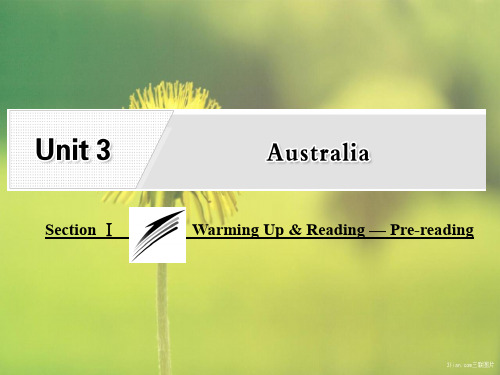
→ adequately adv. 适当地;足够地 5.ecology n.生态学;生态→ ecological adj.生态学的;生态的
Laws in England during this period were very harsh, and people were punished severely for even the smallest crimes.A man could be sentenced to death for hunting on another man's property or he could be put to death for chopping down someone else's tree.For many other crimes, the punishment was“transportation”.The guilty person was shipped to a distant land where he was forced to work without pay.Often women and children were shipped to other land, too.
4.I've made a reservation by the Indian Pacific train to Perth. by→on
5.There is also a range of short walks. is→are
- 1、下载文档前请自行甄别文档内容的完整性,平台不提供额外的编辑、内容补充、找答案等附加服务。
- 2、"仅部分预览"的文档,不可在线预览部分如存在完整性等问题,可反馈申请退款(可完整预览的文档不适用该条件!)。
- 3、如文档侵犯您的权益,请联系客服反馈,我们会尽快为您处理(人工客服工作时间:9:00-18:30)。
人教版英语精品资料(精修版)
Unit1 Warming up,Pre-reading and Reading参考学案
Period One
15分钟预习案
Warming up, Pre-reading, Reading
词汇过关
1. 单词记忆
1) _____________美;美人,2) _____________庆祝;祝贺
3) ____________赞美;钦佩4) _____________宗教上的;虔诚的5) _____________祖先;祖宗6) _____________信任;信仰
7) _____________获得;得到8) _____________独立的;自主的
9) _____________搜集;聚集10) ____________农业的;农艺的
2. 短语记忆
1) _____________发生2) _____________纪念;追念
3) _____________盛装;打扮4) ___________搞恶作剧;开玩笑
5) _____________期望;盼望6) _____________日夜;整天
7) _____________好像8) ____________玩的开心
9) _____________纪念死者10) ___________以….而骄傲
3. 句型记忆
1) On this important feast day, people eat food __________ __________ __________ _________
Sku lls and cakes with “bones’’ on them .
在这个重要的节庆日子里,人们会吃制成颅骨形状的食物,和装点有“骨头” 的蛋糕。
2)If the neighbors don’t give any sweets, the children might ________ _________ _________ on them.
如果邻居什么糖也不给,那么孩子们就可以捉弄他们了。
3) People are grateful because their food _______ _______ _______the winter and the agricultural work is over.
越冬的粮食收集起来了,农活结束了,人们都心怀感激。
4) At the spring Festival in China, people eat dumplings, fish and meat and may give children _____________ __________ in red paper.
中国人过春节要吃饺子、鱼和肉,还要给孩子们送红纸包着的压岁钱。
5) The country, ________ _________ cherry tree flowers, looks as though it is covered with pink snow.
节日里整个国度到处是盛开的樱花,看上去就像覆盖了一层粉红色的雪。
词汇、短语精练
1. celebrate / congratulate vt. 庆祝,祝贺
1)We ___________ the New Year with a dance party.
2)I _____________my friend on her birthday.
3) Let me ___________ you on the birth of your daughter.
2 . starve ① vi. 饿死;挨饿;渴望;② vt. 使饿死;使挨饿
1) Have you got any food in your house? I ______ _______.
我饿坏了,你家有什么吃的吗?
2)Many children ______ ________ love.
许多儿童渴望得到爱。
3)The explorers __________ ___________ ___________in the desert.
探险者们在沙漠中饿死了。
3 admire vt 倾佩,赞赏,羡慕;夸奖;喜欢
1) I _______ _______ ________ the way she solves the problem.
我倾佩她解决问题的方式。
2) We _________Madame Curie ________her discovery.
我们佩服居里夫人
4gain ①n/v 获得,增加,②(钟表)走得快
1) He has_______ _______ ________ these years
这几年来,他获得了丰富的经验
2) The clock _______ _______ ________ every hour.
钟表每小时快两分钟
3)I have___________ ________ and looked much better recently.
我最近体重增加,脸色好看多了
美文背诵
Christmas Is Coming
I like Christmas, it is just like our Spring Festival. Maybe the Spring Festival is much more important and interesting than Christmas, but I like Christmas Day better. Because we can spend time with our friends and classmates during Christmas. When it is snowy, Christmas becomes much more lovely, just like in fairytales. I can imagine I am in a fairytale; the girl who sold the matches is my friend, the ugly duck becoming more and more beautiful and so on. What a beautiful place! So we can also call Christmas “Snowy Lovely Day.”
On Christmas Day, shops are red and green. There are so many Christmas cards, Christmas hats, Christmas dolls and many colorful things. So shops look very beautiful. We can give a card or a doll to our friends and say “Merry Christmas.” By the way, I think studying can also become much more interesting.
Christmas is coming, it also means a new year will come. Let’s study harder to welcome the new year!
参考答案
词汇过关
1. 单词记忆
1) beauty 2) celebration 3) admire 4) religious 5 ancestor 6)belief 7)gain 8) independent 9)gather 10) agricultural
2. 短语记忆
1) take place 2) in memory of 3)dress up 4)play a trick on 5)look forward to 6)day and night 7)as though 8)have fun with 9) honor the dead 10)be proud of
3. 句型记忆
1) in the shape of
2)play a trick on
3) is gathered for
4) lucky money
5) covered with
词汇、短语精练
1. 1) celebrated 2) congratulated 3) congratulate
2. 1) am starving 2) starve for 3) starved to death
3. 1) admire her for 2) admire for
4. 1) gained rich experience 2) gains two minutes 3) gained weight。
